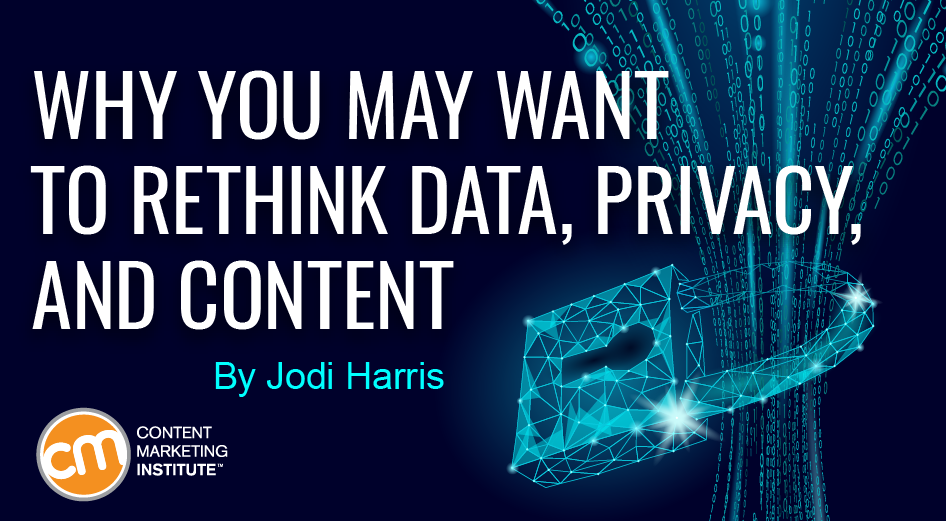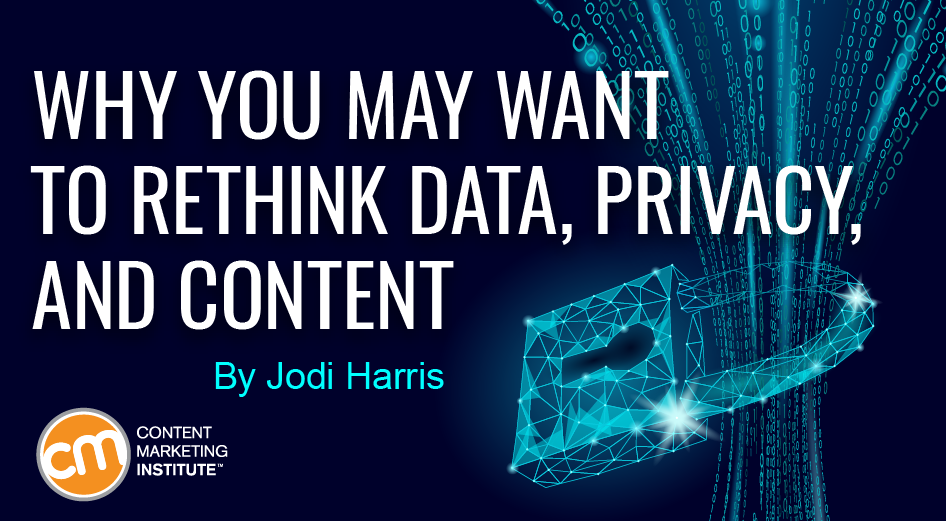Did you follow the #PlaneBae saga as it jumped from social media channels to national news item? If so, you saw the turn it took from lighthearted love story to a much darker reminder of the unexpected ways our digital footprints affect our (and others’) lives. Unwanted social media exposure is just the tip of the iceberg when it comes to digital privacy concerns. This concern should also extend to the work we do as content marketers. Changing privacy laws in Europe and, now, the U.S. have given us compliance-driven motivation to be more vigilant and transparent in our handling of consumer data. But it’s the trusted relationships we hope to build with our audiences that give us even more compelling reasons to care about those who willingly share their personal lives with our brands. Here’s a look at some recent articles that have the CMI team (and, likely, other content marketers) pondering big questions about what data we can collect and what practices and processes we should follow to create trustworthy content experiences for our audiences. But the woman being watched, dubbed #PrettyPlaneGirl by social media and who didn’t know about the tweets until after the fact, didn’t see the posts as a positive. Read: Health Insurers Are Vacuuming Up Details About You Your brand may be upfront about its intentions for using the audience data it collects through content, but that doesn’t mean situations can’t or won’t change. Cover image by Joseph Kalinowski/Content Marketing Institute Author: Jodi Harris Jodi Harris is the Director of Editorial Content & Curation at Content Marketing Institute.

Did you follow the #PlaneBae saga as it jumped from social media channels to national news item? If so, you saw the turn it took from lighthearted love story to a much darker reminder of the unexpected ways our digital footprints affect our (and others’) lives.
Unwanted social media exposure is just the tip of the iceberg when it comes to digital privacy concerns. With health insurers peeking at our online activities and AI algorithms analyzing online behaviors to assign everything from article preferences to loan or job suitability to prison sentences, protecting personal data is something everyone should be concerned with.
This concern should also extend to the work we do as content marketers. Changing privacy laws in Europe and, now, the U.S. have given us compliance-driven motivation to be more vigilant and transparent in our handling of consumer data. (See the privacy law recently passed in California.) But it’s the trusted relationships we hope to build with our audiences that give us even more compelling reasons to care about those who willingly share their personal lives with our brands.
Here’s a look at some recent articles that have the CMI team (and, likely, other content marketers) pondering big questions about what data we can collect and what practices and processes we should follow to create trustworthy content experiences for our audiences.
Should digital privacy encompass more than just data?
Read: The Woman in the #PlaneBae Saga Breaks Her Silence
Social media fans may recall the recent viral story in which an airline passenger claimed a simple act of switching seats led to a love connection between strangers. All indications seem to be that @roseybeeme (who reportedly gained 60,000 followers as a result of her posts) tweeted ongoing observations of the new seatmates with the best of intentions. (It has since been deleted.) But the woman being watched, dubbed #PrettyPlaneGirl by social media and who didn’t know about the tweets until after the fact, didn’t see the posts as a positive. She released a statement that referred to the incident as “a digital-age cautionary tale about privacy, identity, ethics, and consent.”
Consider: That seemingly innocuous public post you uploaded could be someone else’s private nightmare. The #PlaneBae saga played out without a brand’s intervention. But it’s not hard to imagine how easy it would be for an employee to post something similar on your brand’s behalf without considering the possible consequences. Before you (or your extended team) share someone else’s story in your brand’s content, exercise simple common sense – and common courtesy. Make sure your brand follows sound ethical practices by securing the appropriate permission. And don’t forget to verify that your take on the story is accurate.
What constitutes a valuable data exchange?
Read: Health Insurers Are Vacuuming Up Details About You
Your brand may be upfront about its intentions for using the audience data it collects through content, but that doesn’t mean situations can’t or won’t change. It also doesn’t guarantee that third-party partners or others with the power…

COMMENTS